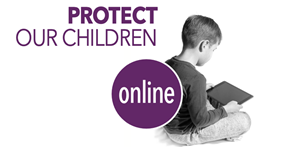
Dear Friend,
I want to draw your attention to a dark topic.
It’s a difficult subject to tackle, but we can no longer ignore it.
Experts are sounding the alarm about a disturbing rise in cases of children being sexually assaulted
by other children.
This alarming trend is largely being attributed to early and frequent exposure to online pornography. More children are viewing pornography online and some are acting out what they see on other children.
It’s frightening how easy it is for a young person to stumble upon pornographic images on any of their digital devices accidentally or unintentionally – while doing homework, playing games online, or simply browsing the internet. It is estimated that 90% of children 8-16 have viewed online pornography, whether inadvertently or deliberately.
The pornographic material that existed
before the digital age is very different from the degrading images that are being dispersed all over the internet today. Much of today’s mainstream pornography is sexually violent and cruel to an extent unimagined in the past. It is misogynistic and centered around the abuse, domination, and humiliation of women.
And then, kids do what kids do – they mimic or act out what they see on those they have the easiest access to. This means that the victims are usually the child’s friends or family members (like a younger sibling). At one children’s hospital, patient records reveal that assault victims are most likely girls between 4 and 8 years-old and perpetrators between 11 and 15 years-old.
Early and repeated exposure to pornography has been shown to significantly harm the development and health of young people. When children view pornography that portrays abusive and misogynistic acts, they begin viewing such behaviour as normal and acceptable. Mainstream pornography teaches them that sex is selfish, aggressive, or violent; that sex is expected, and that consent is not necessary; and that sexual partners are objects to be used for pleasure. They learn to devalue and objectify other human beings.
Furthermore, children exposed to graphic pornographic images experience mental trauma. They report feelings of disgust, shock, embarrassment, anger, fear, and sadness after viewing pornography. This leads to increased rates of depression, anxiety, and violent behaviour.
Allowing children unfettered access to online pornography, with no regulation or restrictions, is a form of child abuse.
Research shows that young teens who are exposed to sexually explicit content are more likely to engage in risky sexual behaviors – including early sexual debut, unsafe sexual practices, and sexual promiscuity – and to accept violence towards women.
Early and frequent exposure to pornography distorts views on what healthy intimate relationships look like. It shapes what a young person will expect and accept in their relationships. Young boys who are exposed to pornography are more likely to sexually harass and be violent. They are more likely to see women as sexual objects who exist only to satisfy men’s desires. Girls exposed to pornography are more likely to accept sexual harassment or to be victims of rape. They are more likely to believe it is normal for their partner to be violent or that their bodies exist as objects to please others.
As the dominating influencer in the sexual education of our kids today, online pornography is teaching them that sex has nothing to do with intimacy, commitment, love, or mutual respect. Rather, it is about self-gratification without regard for the other person’s boundaries, objections, pain, or humiliation.
The Canadian government must take steps to protect minors from online pornography.
Many groups, including the EFC, are committed to protecting our young people from the serious harms of online pornography. We have been urging the federal government to enact laws requiring commercial pornography websites to have strict and comprehensive measures in place to protect our children and youth from exposure to inappropriate adult content online.
The EFC is grateful that
Bill S-210, An Act to restrict young persons’ online access to sexually explicit material, was passed by the Senate in April 2023. Web sites hosting pornography would be required to verify that the visitors are adults before they can access the content. However, the Bill is not yet law. It will be deliberated in the House of Commons when Parliament resumes sitting this fall. It is urgent that we work with our MPs to ensure that this important bill gets passed.
Children should be able to access and safely engage in the digital environment without being harmed by exposure to pornography. We cannot allow the pornography industry to shape their beliefs about, and understanding of, sexuality. Exposure to pornography puts our children at risk of developing destructive attitudes and behaviours that pollutes
all their relationships—with God and with others.
You can do something today to protect Canada’s next generation – their health and well-being, their marriages, their families, and society as a whole – from the harms of pornography. Will you partner with us financially and in prayer as we work to get Bill S-210 passed into law and to create other pieces of legislation to protect our children and youth from online harms?
Thank you for standing with us!
Dr. David Guretzki
President & CEO